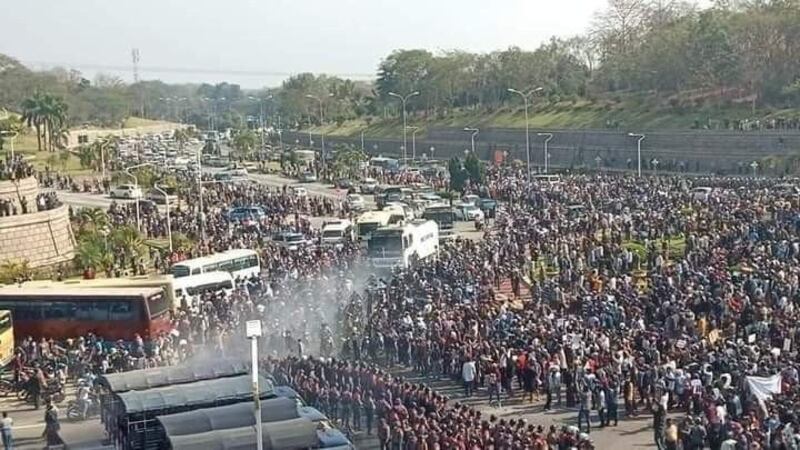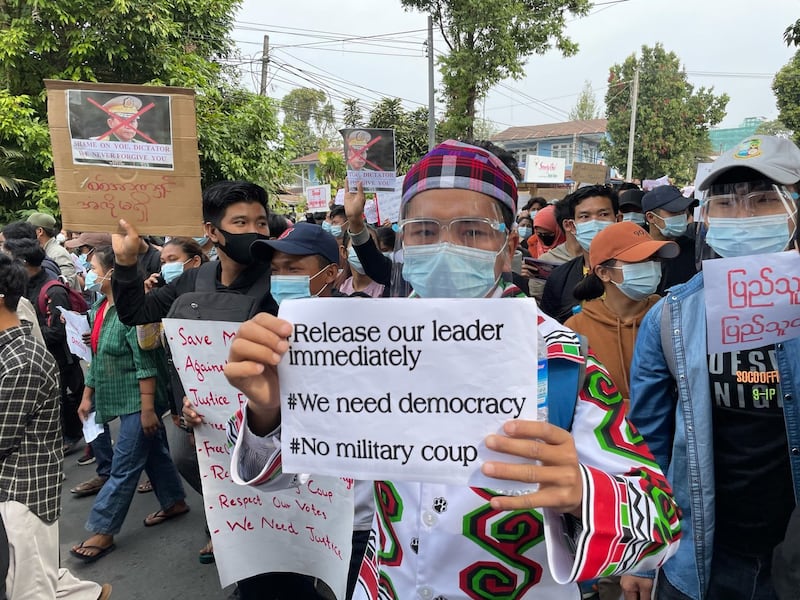Myanmar’s military junta on Monday set curfews and other restrictions in major cities, unveiling the decrees as peaceful public protests across the country drew hundreds of thousands of marchers demanding the reinstatement of deposed Aung San Suu Kyi and her elected government.
Weekend mass protests that drew tens of thousands in dozens of cities were followed by larger crowds Monday in Yangon, Mandalay and the capital Naypyitaw, where police fired a water cannon to disperse crowds, injuring one person before protesters blocked the vehicles that were hosing them down.
After a week of silence after the Feb. 1 putsch removed Aung San Suu Kyi and her government, arresting her and scores of officials, the junta issued decrees and coup leader and junta chief Senior Gen. Min Aung Hlaing appeared on state television to repeat the election fraud claims the army has used to justify the military takeover.
A junta statement carried on state-run MRTV and the military information committee website banned gatherings of more than five people as well as motorized processions, while imposing an 8 p.m. to 4 a.m. curfew on a township-by-township basis in parts of Yangon and Mandalay, the country’s largest and second-biggest cities.
“Marching on foot or vehicles, inciting the public, destroying or rioting are all forbidden in Chan Aye Thar Zan Township,” said a warning broadcast in Mandalay.
Protesters are calling for Aung San Suu Kyi’s release from detention and rejecting the new military government led by Senior Gen. Min Aung Hlaing.

In his first public speech since the coup, Min Aung Hlaing said Monday that the military had to take over because no attempt had been made by the authorities to address election fraud complaints raised by the army and its allies since the Nov. 8 elections.
He said the military government is “absolutely not going to change foreign policy, administrative policy, or economic policy” and would “continue along the same political path” of the ousted government.
Another election at the end of the one-year state of emergency and “we will protect and establish a real and disciplined democratic system,” Min Aung Hlaing said in a 20-minute televised speech that did not mention Aung San Suu Kyi or the swelling nationwide protests against the coup.
“After the emergency authority and term provided by the constitution, we will be holding a free and fair election in accordance with the 2008 constitution and will hand over the power to the elected government in accordance with democratic rules and values,” Min Aung Hlaing said in his speech.
MRTV on Monday made its first mention of the protests, describing them as a threat to stability in the country of 54 million people.
“Democracy can be destroyed if there is no discipline,” said a statement from the Ministry of Information, read on MRTV. “We will have to take legal actions to prevent acts that are violating state stability, public safety and the rule of law.”
In Yangon, student protestors led crowds to march to city hall, where police and water cannon vehicles were blocking thoroughfares, witnesses told RFA.
In a counter-protest in support of the military coup in Yangon, around 500 people rode around on cars waving the national flag and posters “STOP.”
In Mandalay, hundreds of thousands of protesters marched on the main streets, according to witnesses. There are also widespread protests in population centers in Mon, Kayin, Shan and Rakhine states, as well as the regions of Tanintharyi and Irrawaddy, sources told RFA.
Monday’s crowds eclipsed those of a 2007 campaign against the military junta led by Buddhist monks, and by some accounts rivaled those of the massive 1988 pro-democracy uprising that brought Aung San Suu Kyi to prominence. Both of those pro-democracy movements were put down by the military with deadly force and mass arrests.
Ministers in Aung San Suu Kyi’s government remain under house arrest or in detention, with the chief ministers of Yangon, Mandalay and Kayin states released and detained a second time after criticizing the coup.
The Assistance Association for Political Prisoners, a watchdog group, said Monday that 170 people have detained in relation to the military coup with only 18 released. Most are politicians, it said.
“They treated us like criminals. We are family members of elected government officials,” said Khin Mi Kywe, wife of Yangon Region Chief Minister Phyo Min Thein, who was detained for the second time on Feb. 5.
“Today is particularly important because government employees will protest by not working. I will go out and join the people in the protest. We will able to resist the military regime only when we act in unity,” she told RFA’s Myanmar Service.

Reported by RFA’s Myanmar Service. Translated by Ye Kaung Myint Maung and Kyaw Min Htun. Written in English by Paul Eckert.
